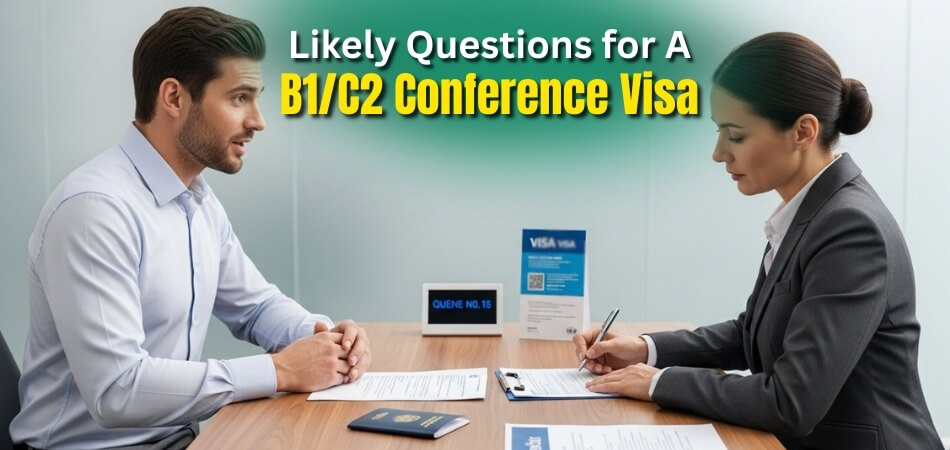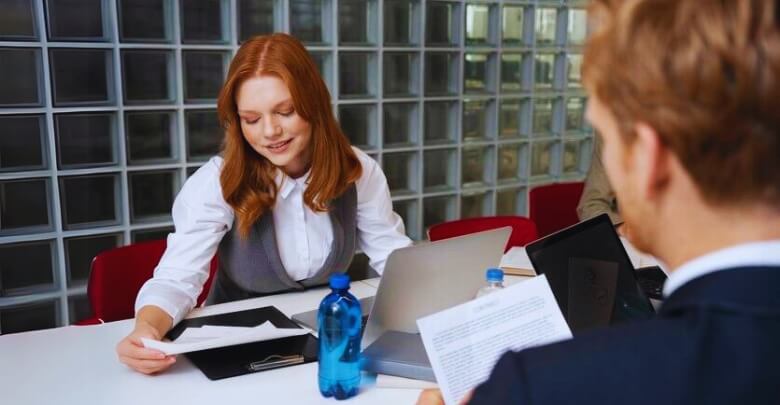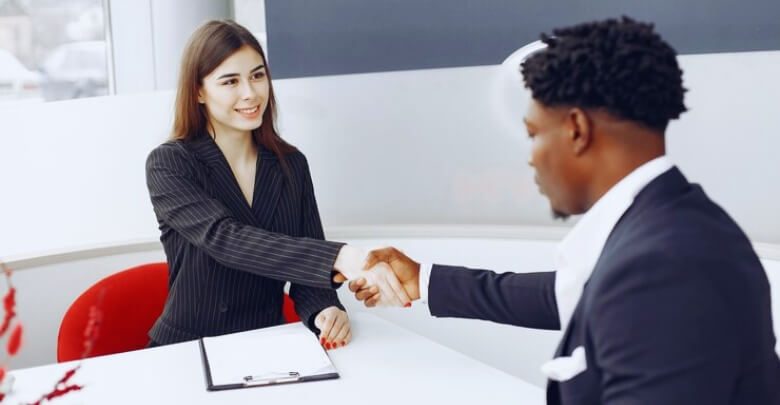Preparing for a visa interview can feel overwhelming, especially when you’re heading to an international conference. The excitement of meeting professionals, learning new ideas, and expanding your network often comes with the pressure of passing the embassy interview. That’s where most applicants get nervous and wonder what to expect.
So, what are the likely questions for a B1/C2 conference visa? Typically, you’ll be asked about the purpose of your visit, details of the event, your job background, financial support, and ties to your home country. These questions help the officer understand your true intentions.
The good news is that with the right preparation, you can face these questions confidently and improve your chances of success. Keep reading to explore the common questions, sample answers, and practical tips that will make your interview smoother.
What Are the Likely Questions for a B1/C2 Conference Visa?
Stepping into a visa interview can feel tense, but most of the questions are straightforward. The officer mainly wants to confirm that you’re traveling for the right reasons, can afford the trip, and plan to return home afterward. Let’s go through the common conference visa interview questions and answers you should be ready for.
Purpose of Visit
Question: Why are you attending this conference?
Good Answer: “I’m attending the [conference name] to gain knowledge in my field and connect with professionals. The sessions directly relate to my work, and I’ll bring back insights for my employer.”
Question: What will you do at the conference?
Good Answer: “I’ll attend key sessions on [specific topics] and meet colleagues from my industry. I may also join networking events to exchange ideas.”
Duration & Travel Plans
Question: How long will you stay in the U.S.?
Good Answer: “I plan to stay for [X days/weeks], covering the conference dates from [start date] to [end date], plus a short buffer for travel.”
Question: Where will you stay during your trip?
Good Answer: “I’ve reserved a room at [hotel name] near the conference venue. I have the confirmed booking with me.”
Professional Background
Question: What is your current job?
Good Answer: “I work as a [job title] at [company name]. My role involves [brief duties], which connect directly with the conference theme.”
Question: How does your employer benefit from your attendance?
Good Answer: “By attending, I’ll gain skills and updated knowledge that will improve my work performance. I’ll also share conference insights with my team.”
Financial Support
Question: Who is paying for your trip?
Good Answer: “My employer is covering my travel, stay, and registration. I have a letter confirming their support.”
—or—
“I’m funding the trip personally, and I have the financial statements to show stability.”
Question: Can you prove your financial stability?
Good Answer: “Yes. I’ve brought recent bank statements and salary slips to show that I can comfortably cover expenses.”
Intentions to Return
Question: What ties do you have to your home country?
Good Answer: “I have a full-time job, close family, and property in my home country. I’m expected back at work immediately after the event, along with plans for attending upcoming international conferences in Canada later this year.”
Future Plans
Question: Do you plan to work or stay in the U.S. after the conference?
Good Answer: “No. My purpose is only to attend the conference and then return home. I have no plans to work or remain in the U.S. afterward.”
These questions may sound simple, but answering with confidence and honesty is the key. Keep your responses short, clear, and backed by documents when needed. Remember, the officer is checking if your trip is genuine. So, relax, prepare well, and speak naturally.
U.S. vs. Canada: Which Visa Do You Actually Need?
Planning to attend an international conference is exciting, but sorting out the right visa often causes confusion. Many travelers think the same visa works everywhere, but rules differ. Here’s a simple decision box to guide you toward the correct option.
U.S. → B-1 Business Visa
A B-1 visa lets you attend professional conferences, seminars, or meetings in the United States. It’s strictly for business activities like networking and presentations. It does not allow you to take paid employment or long-term study.
Canada → Business Visitor Visa / TRV / eTA
If the event is in Canada, you enter as a business visitor. Depending on your passport, you’ll need a Temporary Resident Visa (TRV) or an Electronic Travel Authorization (eTA). Full details are covered in our Canada Business Visitor Guide.
Transit → C-1 Visa
A C-1 visa is meant for travelers passing through the U.S. en route to another country. It covers short stops only and cannot be used for attending conferences, meetings, or any type of business-related activities.
Picking the right visa early helps avoid delays and rejections. Always review the official rules for your destination, and if your event is in Canada, follow the link above for the full guide tailored to conference travelers.
What Documentation Do You Need for a B1 Visa?
Before your visa interview, it’s important to make sure you have all the right documents ready. Missing even one requirement can create delays. Here’s a detailed checklist you can follow to prepare confidently.
- Valid Passport: Your passport must be valid for at least six months beyond your planned stay in the U.S. This ensures you won’t face entry issues at the border or consulate.
- DS-160 Confirmation Page + Photo: Complete the DS-160 form online and bring the confirmation page. Attach a recent passport-style photo that meets U.S. visa photo requirements for size, quality, and background.
- MRV Fee Receipt: Proof of payment for the non-refundable visa application fee is required. Keep both the online confirmation and printed copy to present at your interview.
- Interview Appointment Confirmation: A printed appointment letter confirming the date and time of your embassy or consulate interview. This shows you have booked a proper slot for processing.
- Employer Support Letter: A letter from your employer confirming your position, salary, and the reason for your trip. It should clearly state that you will return to work after the conference.
- Invitation Letter from Conference (Optional): While not always mandatory, this letter strengthens your case. It confirms your participation and provides details about the event’s purpose and your role in it.
- Financial Proof: Documents such as recent bank statements, pay slips, or sponsorship letters that demonstrate you can cover all travel and stay expenses during your visit.
- Travel Itinerary: Include confirmed flight tickets, hotel reservations, and the official conference schedule. A clear itinerary helps the officer see that your plans are well organized and time-limited.
- Evidence of Ties to Home Country: Strong proof that you will return after your visit, such as ongoing employment, family commitments, property ownership, or business registration documents.
Having all these documents neatly organized shows the consular officer that you are prepared and serious about your trip. Keep originals and copies in a folder so you can present them quickly and confidently during your interview.
How to Schedule Your Visa Interview?
Getting your visa interview scheduled is one of the most important steps before traveling to a conference. Many applicants feel lost because of the different forms and portals, but the process is simple if you follow it step by step. This stage often comes after applicants have already reviewed common B1 conference visa questions to prepare for the interview itself. Here’s how to do it right.
Step 1: Complete DS-160
Fill out the DS-160 form online with your personal and travel details. Once finished, print the confirmation page, as it will be required during your interview. Double-check your answers for accuracy before submission.
Step 2: Create a Country-Specific Profile
Go to the official UStraveldocs website for your country and create a profile. This account will let you manage your application, pay fees, and book your appointment. Use the same details from your DS-160 to avoid mismatches.
Step 3: Pay the MRV Fee
Pay the Machine-Readable Visa (MRV) fee through the payment options listed on your country’s portal. Keep the receipt safe because you’ll need the payment number when booking your interview. This fee is non-refundable.
Step 4: Book Your ASC + Interview
Log back into your profile and choose available dates. You will usually book two appointments: one at the Application Service Center (ASC) for fingerprints and photos, and the other at the embassy or consulate for the interview.
Step 5: Gather and Prepare Documents
Before the interview, collect all required documents, including your DS-160 confirmation, MRV fee receipt, appointment letter, passport, employer letter, and financial proof. Organize them in a folder so you can present them easily when asked.
Following these steps in order makes the scheduling process smooth and stress-free. Always rely on the official embassy or consulate website for updated instructions, as details can vary by country. Careful preparation here will save you time later.
Common Mistakes & How to Avoid Them
Even small errors during the visa process can make your interview harder than it needs to be. The good news is most mistakes are avoidable if you prepare carefully. Let’s look at some of the most common issues and how you can fix them quickly.
Vague Employer Letters
A weak letter from your employer can raise doubts about the purpose of your trip. Make sure it clearly states your position, salary, reason for attending, and confirmation of your return. Using a simple, structured template can help avoid confusion.
Weak Financial Proof
Showing only one recent bank slip or incomplete statements won’t convince the officer. Instead, bring 3–6 months of bank statements, salary slips, or sponsorship letters. This proves you can cover all costs during your stay without relying on outside help.
Incomplete Itinerary
Many applicants bring only a flight ticket and a hotel booking. Strengthen your case by adding the full conference schedule with session titles, keynote names, and networking events. This shows you have a clear, time-limited purpose and no hidden plans.
Overstaying Fears
Officers often worry that applicants might stay longer than allowed. You can ease this concern by highlighting ties to your home country—such as your job, property, or family—and presenting a confirmed return ticket that matches your stated travel plan.
Conference Visas Don’t Cover Family Travel
Another common mistake is bringing family on a conference visa, which is not permitted. Each traveler must apply for the correct visa type. Trying to include dependents under your B1 application can result in refusal or unnecessary complications.
Applying Outside Home Country
If you apply in a country where you don’t normally live, expect longer wait times and tougher questions. The safer choice is applying in your country of residence, but if you must apply abroad, book early and prepare extra documentation.
These mistakes are common but easy to fix with preparation. By keeping your documents clear, your answers consistent, and your plans well-detailed, you’ll make a stronger impression. Think of each point above as a quick checklist before your interview.
How Do You Get a Successful Embassy Interview?
Your interview is the final step that decides whether you’ll receive your visa. Even if your paperwork is perfect, your behavior during the meeting matters a lot. Small things like how you dress, speak, and respond can create a strong impression. Let’s look at the key points.
Dress Professionally
Choosing the right outfit sets the tone from the moment you arrive. A neat shirt, formal pants, or business attire shows respect for the process. You don’t need expensive clothes, but avoid casual wear like t-shirts or sneakers. Looking professional signals that you take the interview seriously.
Answer Honestly and Concisely
The officer doesn’t expect long speeches, only clear and truthful answers. Be ready to explain your purpose in simple words without unnecessary details. If asked about your job or travel plans, keep it short and factual. Honesty builds trust, while over-explaining may raise unnecessary doubts.
Stay Calm Under Pressure
Nerves are natural, but try not to let them overwhelm you. If you feel stuck, take a breath and ask for clarification instead of rushing into a confusing answer. Speaking in a steady tone and maintaining eye contact helps the officer see your confidence and sincerity.
Be Respectful and Polite
Good manners go a long way in creating a positive impression. Greet the officer politely, listen carefully, and avoid interrupting. Even if a question feels repetitive, respond with patience. A respectful attitude shows maturity and responsibility, which strengthens your application beyond just the documents you provide.
A successful embassy interview is more about behavior and preparation than memorized answers. Dress well, stay calm, answer clearly, and show respect throughout the process. These small but powerful habits can tip the balance in your favor and help you walk out with confidence.
Frequently Asked Questions
Getting ready for a visa interview often leaves applicants with small doubts that aren’t covered in the main guide. These questions may seem minor, but they matter when you want to avoid mistakes. Here are some helpful answers you’ll want to know.
Can I Reschedule My Visa Interview If I Miss the Date?
Yes, you can reschedule your interview through the same country-specific visa portal. However, missing an appointment without notice may delay your travel plans. Always try to reschedule in advance to avoid complications.
Should I Carry Original Documents or Photocopies?
You should bring original documents, but carrying photocopies is also a smart idea. Officers sometimes ask to see both versions. Originals prove authenticity, while photocopies make the review process faster and easier.
Can I Attend Multiple Conferences During the Same Trip?
Yes, you can attend more than one event as long as they fall within your visa validity period. Mention this plan during your interview. Having schedules and registrations for each conference strengthens your application.
Do Language Skills Affect My Interview Result?
No, fluency in English is not a requirement for visa approval. Officers focus more on your documents and intentions. Speak clearly in any language you are comfortable with, and ask for clarification if needed.
What Happens If My Visa Gets Refused?
If your visa is refused, the officer will usually give you a reason. You can reapply after fixing the issues, such as weak documents or unclear answers. Always review your case before trying again.
Can I Travel Before the Conference Start Date?
Yes, you may enter a few days earlier, but it’s best to keep your timeline close to the event. Extra days should be reasonable and well-documented. Officers prefer travel plans that clearly connect with the conference.
Is Travel Insurance Required for a B1 Visa?
It’s not mandatory, but having travel insurance is strongly recommended. It shows you are prepared for unexpected situations. Insurance also helps cover medical or travel issues, giving you peace of mind during your stay.
Concluding Words
Understanding what to expect in your visa interview takes away much of the stress. Instead of guessing, it helps to know in advance what officers usually ask and how to answer with confidence. A little preparation can make a big difference.
When people ask, What are the likely questions for a B1/C2 conference visa, the answer is simple. You will face questions about your trip’s purpose, your work background, your finances, and your plans to return home. Each one is designed to confirm your true intent.
By practicing these questions and organizing your documents neatly, you put yourself in a strong position for approval. Keep your answers short, honest, and clear. Preparation today will help you walk into your interview calm and ready.








